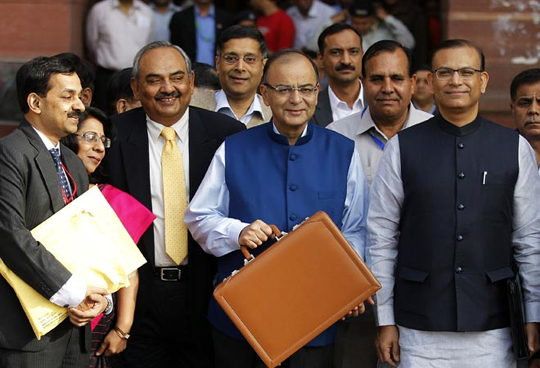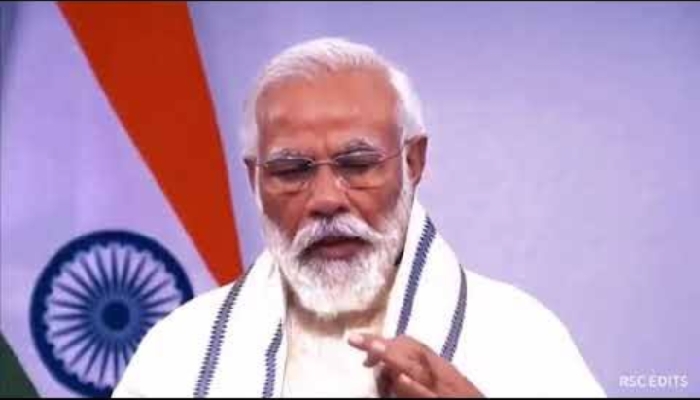New Delhi, Feb 29: The Budget for 2016-17 today offered sops for small and marginal income tax payers, hiked the surcharge by 3 per cent on earnings above Rs 1 crore, levied a pollution cess on petrol, diesel cars and SUVs and offered a one-time compliance window for domestic black money holders slapping a tax and penalty of 45 per cent.
Presenting the third Budget, Finance Minister Arun Jaitley also proposed a 'Krishi Kalyan' cess of 0.5 per cent on all taxable services to improve agriculture and reduction of duties on project imports for cold room for cold chain, refrigerated containers and a number of other items.
Cigarette and tobacco products will become costlier with the hike in excise duty by 10 to 15 per cent.
While the revenue loss on direct taxes will be Rs 1060 crore, his indirect tax proposal will mobilise an additional Rs 20,670 crore. Net revenue gain will be Rs 19,610 crore.
In a bid to shore up the economy hit by global slowdown, the Budget proposes a 15.3 per cent higher expenditure at Rs 19.78 lakh crore in 2016-17, consisting of Rs 5.50 lakh crore under Plan and Rs 14.28 lakh crore under non-Plan.
The Budget provides an outlay of Rs 162,759 crore for defence in 2016-17, up by 13 per cent from Rs 143,236 crore in the revised estimates for the current year. Capital expenditure on defence has been put at Rs 86,340 crore against Rs 81,400 crore in the current year's revised estimates.
Interest payment will account of Rs 492,670 crore against Rs 442,620 crore. Subsidies will marginally lower at Rs 250,433 crore as opposed to Rs 257,801 crore in the revised estimates.
In relief to small tax payers, the Budget proposes to raise the ceiling of tax rebate under Section 87(A) from Rs 2000 to Rs 3000 for incomes not exceeding Rs 5 lakh per annum. There are two crore tax payers in this category who would get a relief of Rs 3000 in their tax liability.
Those who do not have house of their own and do not get house rent allowance from employers will get a deduction of Rs 60,000 per year as against existing Rs 24,000.
First time home buyers will get a deduction of an additional interest of Rs 50,000 per annum for loan upto Rs 35 lakh, during 2016-17, provided the house value does not exceed Rs 50 lakh.
The Budget proposes to extend the presumptive taxation scheme to professionals with gross receipt up to Rs 50 lakh with the presumption of profit being half of the gross receipt.
After pursuing blackmoney abroad, Jaitley today offered a limited period compliance window for domestic holders of unaccounted income and assets to declared their undisclosed income and assets and clear past transgressions by paying tax at 30 per cent plus 7.5 per cent penalty and 7.5 per cent of interest, a total of 45 per cent.
For the foreign blackmoney holders, the total tax and penalty was 60 per cent for those came clean.
In the domestic scheme, the Minister declared that there will be no scrutiny or inquiry regarding income tax declared under the scheme under I-T and Wealth Tax Act and they will have immunity from prosecution.
Immunity from benami transaction act of 1998 is also proposed subject to certain conditions.
The 7.5 per cent surcharge will be called Krishi Kalyan Surcharge to be used for agriculture and rural economy.
"We plan to open the window under this Income Disclosure Scheme from June 1 to September 30, 2016 with an option to pay amount due within two months of declaration," he said.
A Krishi Kalyan Cess of 0.5 per cent would cover all services, proceeds of which will be used for financing incentives for improvement of agriculture and welfare of farmers. The cess will come into effect from June 1.
Raising concern over pollution and traffic situation in cities, Jaitley said he propose to levy infrastructure cess of 1 per cent on small petrol, LPG, CNG cars, 2.5 per cent on diesel cars of certain capacity and 4 per cent on higher engine capacity vehicles and SUVs.
Recalling his last year's promise of reducing corporate tax from 30 to 25 per cent over a period accompanied by rationalisation and removal of exemptions and incentives, Jaitley today limited accelerated depreciation provided under I-T Act to a maximum of 40 per cent from April 1, 2017.
The benefit of deduction for research would be limited to 150 per cent from April 1, 2017 and 100 per cent from April 2020.
To boost domestic manufacturing and job creation, he allowed new units incorporated on or after March 1, 2016 an option of being taxed at 25 per cent plus surcharge and cess provided they do not claim profit linked or investment linked deductions.
He also proposed lower corporate income tax rate for next financial year of relatively small enterprises with a turnover not exceeding Rs 5 crore in fiscal 2016 to 29 per cent plus surcharge and cess. At present they pay 30 per cent plus surcharge and cess.
In a bid to promote employment through startups under the Make-in-India programme, the Budget proposes to assist their propagation through 100 per cent deduction of profit for three out of five years for companies set up between April 2016 and March 2019.
Minimum Alternate Tax will apply in such cases. Capital gains will not be invested in regulated/ notified fund or funds and by individuals in notified startups in which they hold majority shares.
As part of an attempt to incentivise domestic value addition in the Make in India campaign, he proposed to suitable changes in customs and excise duty rates on certain inputs, raw material, intermediaries and components to reduce cost and improve competitiveness of domestic industry in various sectors including IT, IT hardware, capital goods, defence production, MRO of aircrafts and ships, and textiles.
The period of getting benefit of long term capital gain regime in case of unlisted companies is proposed to be reduced from 3 to 2 years.
The controversial General Anti Avoidance Rules or GAAR will be implemented from April 1, 2017, he said.
The 12 per cent surcharge on personal income above Rs 1 crore has been raised to 15 per cent.
The Budget also proposes to collect tax at source at the rate of one per cent on purchase of luxury cars exceeding value of Rs 10 lakh and purchase of goods and services in cash exceeding Rs 2 lakh.
It also seeks to impose an excise duty of 1 per cent without input tax credit or 12 per cent with input tax credit, on articles of jewellery excluding silver other than studded with diamond or some other precious stone with a higher exemption and eligibility limit of Rs 6 crore and Rs 12 crore respectively.
As an additional resource mobilisation for agriculture and rural economy, the Finance Minister proposed a 10 per cent additional dividend distribution tax on individuals, HUFs and firms receiving dividend in excess of Rs 10 lakh per annum.
He also proposed a number of measures as part of financial sector reforms that includes enactment of a comprehensive Code on Resolution of Financial Firms to provide with a mechanism to deal with bankruptcy situations in banks, insurance companies and financial sector entities.
This Code together with the Insolvency and Bankruptcy Code 2015, when enacted, will provide a comprehensive resolution mechanism for the economy.
The other steps include amendment of RBI Act to provide statutory basis for a Monetary Policy Framework and a Monetary Policy Committee through the Finance Bill 2016.
He also announced that a comprehensive central legislation will be brought to deal with the menace of illicit deposit taking schemes.
Jaitley proposed Rs 25,000 crore for bank recapitalisation and said the government will also consider the option of reducing its stake to below 50 per cent.







Comments
Add new comment